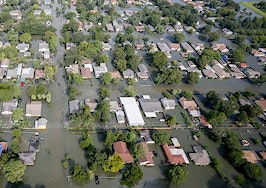The Earth is round, it revolves around the sun, and it’s getting hotter. Debate over the first two items definitively ended many years ago, and the evidence for climate change has piled up well beyond the point of argument. In the latest development, a group of actuarial societies has released the latest update to its Actuaries Climate Index for the US and Canada, and the results ain’t pretty.
What is an actuary?
Actuaries are the professionals who analyze risk based on data. Their findings go into things like calculating insurance rates and, ideally, informing policy makers on steps to avoid or adapt to risk, all in the service of the public good.
Doug Collins, who chairs the Climate Index Working Group for the Index explains:
The insurance industry and actuaries are focused on unusual events that have the highest impact on insurers…the Index has over 2,500 downloads with each update, so actuaries are using it in their models for pricing and risk management.
Collins tells Inman that climate change will generally result in higher prices for property insurance, though other factors may have a more significant impact on a case-by-case basis.
The Actuaries Climate Index at a glance
The Actuaries Climate Index is updated quarterly, with the changing of seasons. It factors in variables that scientists have long predicted as elements in a warming global climate: extremes in temperature, wind, precipitation and drought, and sea level changes.
The data is loaded into units of standard deviation from the mean, defined as a 30-year period between 1961 to 1990.
A quick look at the latest chart (all data is available for free download at ActuariesClimateIndex.org) paints the picture.

Deviation from the mean routinely varied in both directions from 1961 to 1990. Since 1990 it has only pointed upwards, in a gradual but unmistakable pattern.
Crunching the numbers, Collins explains that extreme events occurred about 2.5% of the time during the reference period. Currently that rate now stands at 50%.
It’s not the heat, it’s the water…
Caterina Lindman, a fellow at the Canadian Institute of Actuaries, offers an interpretation of the Index from an adaptive perspective.
“We have competent people doing great things in terms of adaptation,” Lindman explains, referring to the Intact Centre for Climate Change Adaption at Canada’s University of Waterloo.
As described by Lindman, the biggest climate risk that allows for human adaptation is flooding. In Canada, insurance companies are taking steps to increase flood resilience. Some of those steps are simple and inexpensive, like retrofitting existing homes with longer downspouts and covering window wells with plastic shields.
At the other extreme, residents in flood-prone areas are being relocated. That process has gone on in the US for years, and the data indicates the need to to intensify that approach.
…and more water
Rachel Cleetus, the lead economist and policy director of the Climate and Energy Program at the Union of Concerned Scientists, also counts flood risk among the hazards that need to be addressed as a matter of public policy:
Most flood insurance policies for homes and small businesses are provided through the National Flood Insurance Program–that program is certainly in a challenging moment, in no small part because of worsening flood risks…Many of these events — including flooding exacerbated by sea-level rise and heavy rainfall events — have the clear fingerprints of climate change on them.
Collins and Lindman emphasize that the Index is not exclusively for professionals. Making risk more transparent and accessible to the public is an important goal, which Cleetus underscores:
The index…is also very informative for the broader public because they are the ones who need to know the risks and buy insurance to protect themselves. It’s also important for policymakers and regulators to understand how these risks are changing and how best to protect the public interest in light of that.
Cleetus also advocates for public policy to look beyond data sources like the Index, and place more emphasis on predictive planning:
It’s crucial that people understand that the past is no longer a good predictor of the future, and climate risks are growing as emissions rise. Climate projections are crucial to help communities, planners, policymakers, engineers etc. understand and prepare for growing climate risks.













